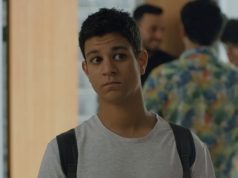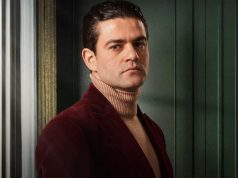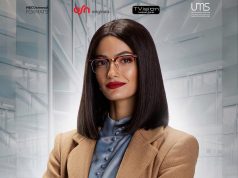When we talked to Dahlia Nemlich, French-Lebanese director, and Pascale Seigneurie, screenwriter and lead actress in Roadblock the short film, they both expressed their ceaseless love for their country and the message they want to send to the world through their film. Straight from Gouna Film Festival, here’s how the script came about and what inspired them to do this film.
Conducted by: Aliaa Elsherbini
Written by: Mariam Elhamy
Tell us a bit about the story of Roadblock
Dahlia Nemlich: The story is about a couple, Farah and Anthony, who are leaving the protest of Tripoli to go back home but they will be stopped by a roadblock and I’m not going to say the rest because it will be spoilers so you will have to watch the film.

Why did you choose this topic in specific?
Pascale Seigneurie: I had started writing the script one year before the actual revolution happened, the topics were already similar because in Lebanon things change but nothing really changes and reality caught up to the things that I had written in the previous version of the screenplay. Of course, we had to adapt a lot to make it fit into the exact frame.
An even earlier version of the script was in the civil war so it jumped through time from 1975 to 2022 to 2019 and the sad part is that it could fit at any of these times.
Dahlia Nemlich: The script was going to take place in 2022 in a post-revolutionary setup. We worked on the script 5 months before the actual revolution started, so we made a quick decision to change some stuff in the script so we could film the actual revolution and not have to reproduce or recreate it a year later.
 How does it feel to have your short movie have its world premier at the GFF?
How does it feel to have your short movie have its world premier at the GFF?
DN: It’s amazing, we’re super proud of it especially because we didn’t have any financial support or foreign co production. Marine Vaillant the producer of Dewberries Films, Lebanese production company, Pascale and myself, the dream team, really put a lot of effort in it.
El Gouna Film Festival is a very prestigious festival so we are super proud of being here and happy that it is physically happening. We got to meet a lot of new people and we’re working on a feature film together so it gives us a lot of opportunity to continue our future projects.
Does Farah’s rebellious side speak to you, Pascale? Does she resemble you?
PS: Yes, of course. I generally write stories because there is something inside me that has to come out. In the case of Farah, as you said she’s the rebellious side of me.
What does Roadblock mean to you? Anything you’re currently working on?
DN: The first layer of the film is the roadblock, which is the metaphor of the situation of Lebanon today, but it also talks about different identities and the capacity of communicating with these different identities.
You have a pure Lebanese who feels like she relates more to the country and you have the character of Anthony, whom I can relate to because I’m a Lebanese who lived in France but that doesn’t mean that I’m less Lebanese because I’ve lived half of my life there.
You also have the question of religion, gender and social background; this mix makes the beauty and chaos of Lebanon. That is the blessing and the curse of being Lebanese so in so many ways we can relate to the subject.
PS: I feel like this story tells the reality of Lebanon’s youth. In Lebanon, nationalism and the sense of belonging is not really strong because we have a conflict of identity. I’m currently working on a long feature based on this but not the same story.
DN: It’s a different direction with the same kind of concept and idea, but with different characters and a different storyline. It is definitely an inspired and aesthetic full feature.
How do you think the film contributed to the cause? What did it shed light on?
DN: I don’t know if it helped in any cause. I hope people can see from the film how absurd it is that we all live in the same country with so many different views. We are bringing the country to more and more chaos because we are not able to accept each other in any way that we are.
Another reason that will make people relate is that I think that Lebanese people like to see images from the revolution, it’s kind of heartbreaking but brings back lots of memories.

If the chance presents itself would you turn Roadblock into a full-length movie? And why?
DN: No, we wouldn’t make Roadblock into a full feature. Roadblock is roadblock; it’s its own thing.
Stay tuned for the full video interview on our Instagram, Facebook, and YouTube channels.
Links:
Roadblock on IMDB
Roadblock page on Facebook
Roadblock on GFF’s official website
Pascale Seigneurie on IMDB
Dahlia Nemlich on IMDB
Marine Vaillant on IMDB







